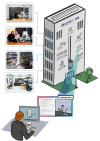Differences
This shows you the differences between two versions of the page.
| Both sides previous revisionPrevious revision | |
| research:production_logistics [2012/09/25 12:56] – [Projects] mga | research:production_logistics [2012/09/26 09:43] (current) – pmania |
|---|
| | |
| The research group //Intelligent Systems in Logistics// develops approaches and methods for controlling, modeling, simulation and evaluation of logistic processes in order to optimize the planning and controlling processes of logistic service providers. The goal is to improve the service quality while ensuring cost- and time-efficiency as well as sustainable production and transport processes within the supply network of companies. | The research group //Intelligent Systems in Logistics// develops approaches and methods for controlling, modeling, simulation and evaluation of logistic processes in order to optimize the planning and controlling processes of logistic service providers. The goal is to improve the service quality while ensuring cost- and time-efficiency as well as sustainable production and transport processes within the supply network of companies. |
| | |
| | {{ :research:plasma_screenshot.jpg?400 | A simulated scenario within PlaSMA}} |
| | |
| The research field covers planning and scheduling algorithms, (distributed) decision making, multiagent systems and interaction, distributed artificial intelligence, knowledge management, data mining, and simulation. New approaches, algorithms, and interaction mechanisms are evaluated with the [[http://plasma.informatik.uni-bremen.de/|PlaSMA Simulation Framework]] as well as directly with production robots in cooperation with the [[http://www.logdynamics.de/?&L=1 |BIBA]]. The PlaSMA Framework enables the simulation of logistic scenarios on real-world infrastructures. It provides a discrete time simulation that ensures a correct conservative synchronization with time model adequacy, causality and reproducibility. | The research field covers planning and scheduling algorithms, (distributed) decision making, multiagent systems and interaction, distributed artificial intelligence, knowledge management, data mining, and simulation. New approaches, algorithms, and interaction mechanisms are evaluated with the [[http://plasma.informatik.uni-bremen.de/|PlaSMA Simulation Framework]] as well as directly with production robots in cooperation with the [[http://www.logdynamics.de/?&L=1 |BIBA]]. The PlaSMA Framework enables the simulation of logistic scenarios on real-world infrastructures. It provides a discrete time simulation that ensures a correct conservative synchronization with time model adequacy, causality and reproducibility. |
| Several PHD students are associated with the [[http://www.logistics-gs.uni-bremen.de/?&L=1|International Graduate School of Logistics (IGS)]]. | Several PHD students are associated with the [[http://www.logistics-gs.uni-bremen.de/?&L=1|International Graduate School of Logistics (IGS)]]. |
| |
| {{ :research:plasma_screenshot.jpg?400 | A simulated scenario within PlaSMA}} | |
| ====Projects==== | ====Projects==== |
| |:::|**Plan GGPII**| | |:::|**Plan GGPII**| |
Prof. Dr. hc. Michael Beetz PhD
Head of Institute
Contact via
Andrea Cowley
assistant to Prof. Beetz
ai-office@cs.uni-bremen.de
Discover our VRB for innovative and interactive research

Memberships and associations:



Social Media:














